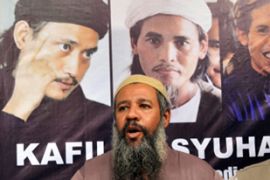Indonesia executes Bali bombers
Thousands of people gather for funerals of three men convicted over attacks in 2002.

However, Al Jazeera’s Step Vaessen, reporting from Tenggulun, said that there had been relatively few disturbances.
“Thousands have gathered here to pay their respects, and it has been quite calm,” she said.
“There were fears of revenge attacks, but there have not been any serious attacks in Indonesia for a long time, and the government has cracked down on militant groups.”
In Serang, the body of Imam Samudra was taken from his wife’s home to a mosque, where about 1,000 people gathered to see the body.
Some shook their fists in the air chanting “Allahu Akbar”, although many appeared to be just curious spectators.
‘Long time coming’
The two explosions on Bali’s Kuta strip in October 2002 – one at Paddy’s Bar and the other at the Sari Club – killed 202 people, including 88 Australians and 38 Indonesian citizens.
 |
| Supporters of the bombers believe they died as martyrs [AFP] |
About 100 Balinese, including some survivors, prayed at a memorial near the site on Sunday.
“Next time the government should be firm in handling the perpetrators of violence,” Tumini, one of the survivors, said. “It’s been a long tiring wait.”
Peter Hughes, an Australian who was badly burnt in the blasts, told Al Jazeera that the executions had brought a sense of closure.
“This has been a long time coming. The guys are mass murderers, they have caused a lot of grief to a lot of innocent people that were there having a good time,” he said.
“The people that have supported the bombers need to have a think about what their real motives were, which was to kill a lot of people, they are certainly not heroes.”
Vaessen reported that the execution of the three convicted bombers was an attempt by the Indonesian government “to show that they are serious in their fight against terrorism”.
“The Bali bombers, who have always said they were happy to die as martyrs, have tried endlessly to postpone their execution with several appeals, even up to the constitutional court,” she said.
“They have tried to escape the firing squad because they said that was against their human rights and they wanted to be beheaded instead. But they lost all appeals.”
Two days ago the families of the men sent a letter to the Indonesian president to ask to for the execution to be delayed.
Tight security
Security has been boosted across Indonesia amid fears of a backlash from a small minority who support the bombers, who said they carried out the attacks to avenge foreign intervention in Iraq and Afghanistan.
In recent days, police have investigated bomb threats received this week against the US and Australian embassies, and an internet letter purportedly written by the bombers threatening the life of Susilo Bambang Yudhoyono, the Indonesian president.
Australia issued a travel warning on Sunday for citizens going to Indonesia amid concerns about possible reprisals.
“It is not a day that fills us with any joy or any celebration,” Stephen Smith, the foreign minister, said on Australian television.
“We continue to have credible information that terrorists may be planning attacks in Indonesia.”
The convicted bombers had warned of retribution in a string of authorised media appearances from prison.
Jemaah Islamiyah, which is allegedly linked to the al-Qaeda network, was accused of planning and financing the Bali bombings.
The Indonesian anti-terrorist unit Detachment 88 has been credited with capturing leaders of the JI group and its military wing in a series of raids last year.